Brexit & Beyond newsletter
3 September 2024
 Welcome to the 3 September 2024 Brexit & Beyond newsletter
Welcome to the 3 September 2024 Brexit & Beyond newsletter
This newsletter rounds up activities over a busy summer. The new Prime Minister met with many European leaders, including the Taoiseach. The Prime Minister also announced that the Paymaster General [Nick Thomas-Symonds MP] as Minister for the Constitution and European Union Relations would take responsibility for the UK’s relationship with the European Union. Minister Thomas-Symonds has been in Belfast, meeting with the First Minister, deputy First Minister and Minister of Agriculture, Environment and Rural Affairs as well as the Chair and deputy Chair of the Windsor Framework Democratic Scrutiny Committee.
The European Parliament was officially constituted on Tuesday 16 July in Strasbourg, following the European elections on 6-9 June. It re-elected Ursula von der Leyen to serve as President of the European Commission for a second five-year term.
UK – Republic of Ireland Relations
Ahead of the European Political Community meeting in July, the UK Prime Minister met the Taoiseach at Chequers on 17 July. They “agreed that the time was right for a reset of the partnership… and agreed to work together over the coming weeks to put in place arrangements to support, encourage and strengthen all aspects of relations.” As part of this, they committed to annual bilateral summits. They will meet again in Dublin on 7 September.
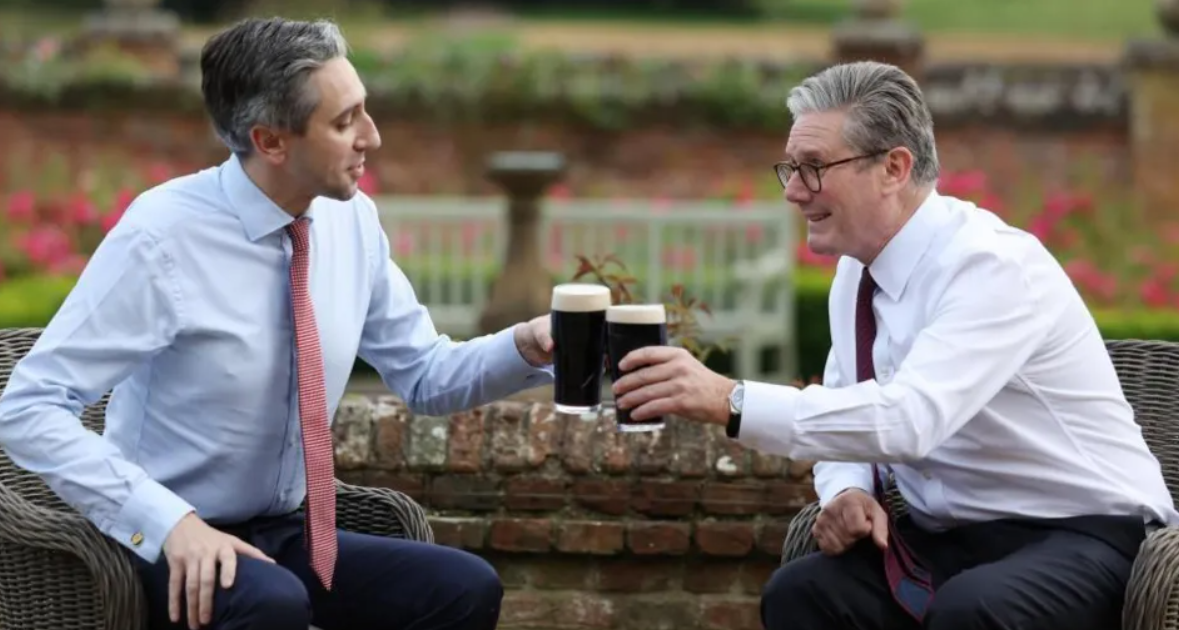 Prime Minister Keir Starmer met the Taoiseach Simon Harris at Chequers on 17 July
Prime Minister Keir Starmer met the Taoiseach Simon Harris at Chequers on 17 July
The European Political Community
The fourth meeting of the European Political Community took place on 18 July at Blenheim Palace in Oxfordshire. The UK Prime Minister hosted 42 heads of state and government including those from 24 EU member states. The leaders reaffirmed their continued support for Ukraine and discussed the topics of energy and connectivity, security and democracy, and migration. The next EPC meeting will take place in November in Budapest.
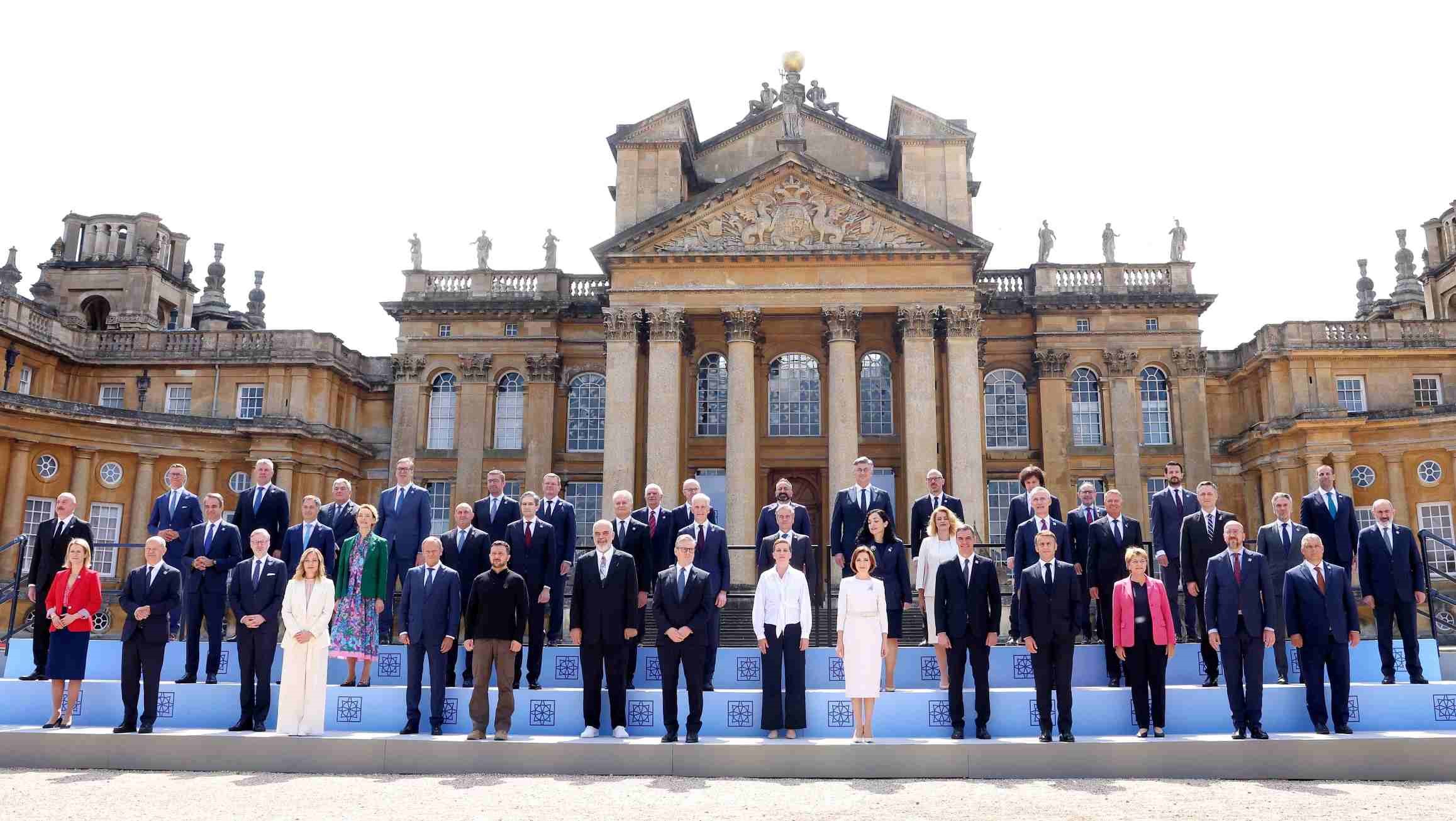 Prime Minister Keir Starmer hosted 42 heads of state and government at the fourth meeting of the European Political Community
Prime Minister Keir Starmer hosted 42 heads of state and government at the fourth meeting of the European Political Community
UK Government relations
On a statement relating to the Machinery of Government, made on 24 July, the Prime Minister announced that responsibility for the United Kingdom’s relationship with the European Union, including co-chairing the Ministerial structures under the UK's treaties with the European Union will move from the Foreign, Commonwealth and Development Office to the Cabinet Office. He wrote, “This change will allow the Paymaster General [Nick Thomas-Symonds MP] as Minister for the Constitution and European Union Relations to drive the Government's European Union agenda, overseeing the existing relationship, and leading the cross-government work to deepen this relationship in the future. The Foreign, Commonwealth and Development Office remains responsible for bilateral relationships, Gibraltar negotiations and Europe strategy using the department’s diplomatic expertise.”
The Minister visited Belfast on 30 July to hear from various stakeholders about the post-Brexit trade barriers that have created the need for checks on goods entering the region from across the Irish Sea. Mr Thomas-Symonds said conversations were ongoing with the European Union but added that he would not expect "hard edged, formal negotiations" to begin until the early part of 2025. Regarding an agreement on sanitary and phytosantitary (SPS) rules, Mr Thomas-Symonds said, "do I hope that an SPS agreement, an ambitious SPS agreement, is going to ease the situation in terms of GB/NI trade? Absolutely, yes."
The Minister held an introductory meeting with Philip McGuigan MLA and David Brooks MLA, Chair and deputy Chair of the Assembly’s Windsor Framework Democratic Scrutiny Committee and met with Assembly Speaker Edwin Poots MLA.
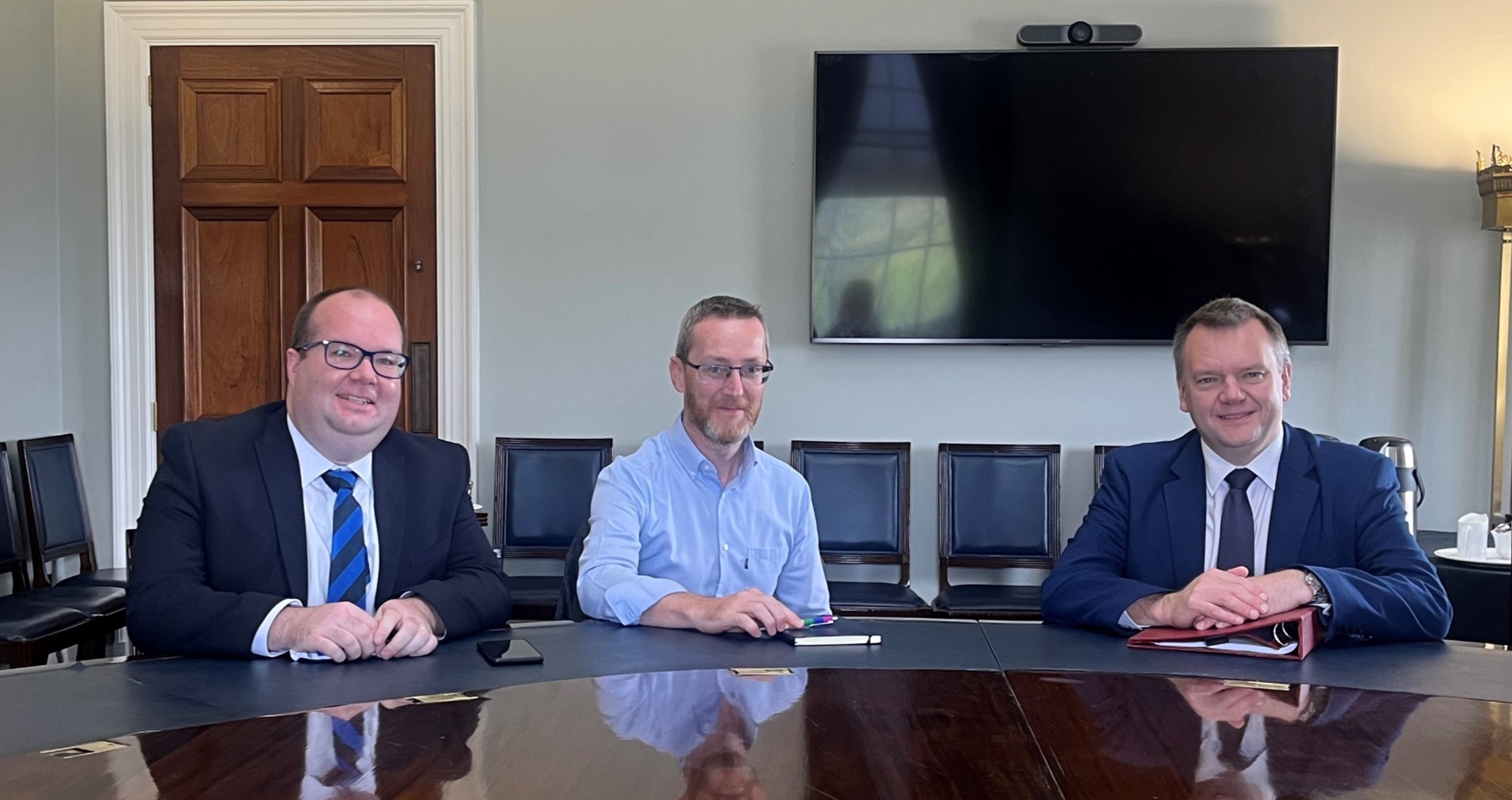 Minister for the Constitution and European Union Relations Nick Thomas-Symonds met with Philip McGuigan MLA and David Brooks MLA, Chair and deputy Chair of the Assembly’s Windsor Framework Democratic Scrutiny Committee
Minister for the Constitution and European Union Relations Nick Thomas-Symonds met with Philip McGuigan MLA and David Brooks MLA, Chair and deputy Chair of the Assembly’s Windsor Framework Democratic Scrutiny Committee
The Secretary of State for Northern Ireland and Minister Thomas-Symonds also met with the First Minister, deputy First Minister and Minister of Agriculture, Environment and Rural Affairs on 29 August to discuss the Windsor Framework and UK/EU reset.
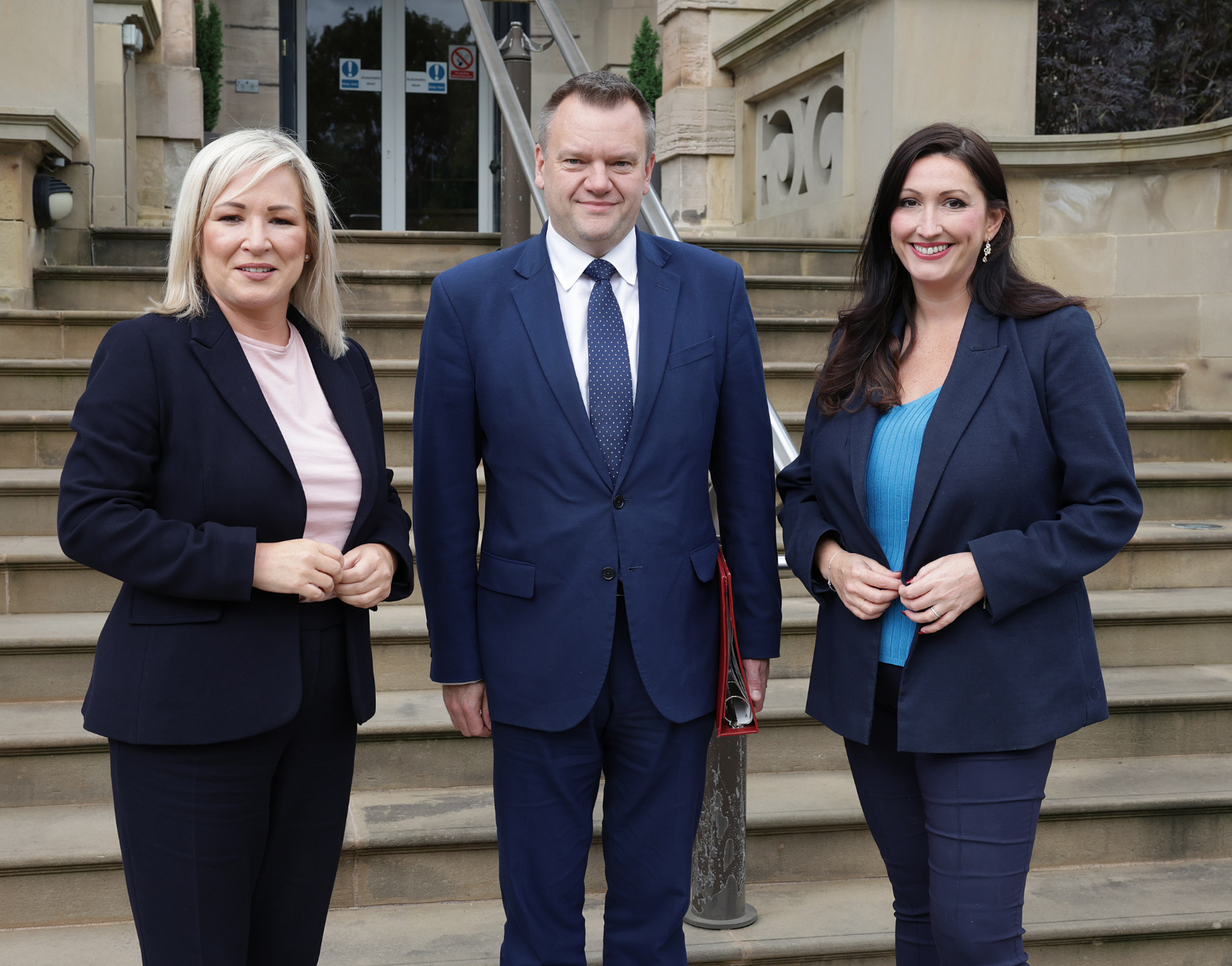 Minister for the Constitution and European Union Relations Nick Thomas-Symonds met the First Minister and the deputy First Minister on 29 August
Minister for the Constitution and European Union Relations Nick Thomas-Symonds met the First Minister and the deputy First Minister on 29 August
The UK was required to give the European Commission a progress report on the completion of SPS inspection facilities in NI (and then every three months until the requirements are met) by 31 July. This has not yet been published.
The Scottish Government published a paper on the benefits of a comprehensive sanitary and phytosanitary (SPS) agreement between the UK and EU on 30 August. It sets out the advantages for Scotland of a comprehensive veterinary and SPS agreement, the background, what will be required and how it can be achieved.
UK Trade
On 29 July, Business and Trade Secretary Jonathan Reynolds announced the Government’s intention to deliver trade talks, starting with the Gulf Cooperation Council, India, Israel, South Korea, Switzerland and Turkey. The first round of trade talks under the new government expected to take place during the Autumn.
The Prime Minister met Chancellor Olaf Scholz in Berlin on 28 August to launch negotiations on a new bilateral treaty with Germany to boost trade and defence cooperation. A joint declaration released after the meeting indicated that both parties hope to sign a new bilateral treaty “by early next year”. Following the visit to Berlin, the Prime Minister travelled to Paris to meet with President Emmanuel Macron.
UK Parliament
The House of Lords European Affairs Committee was reappointed on 29 July, under the continued Chairmanship of Lord Peter Ricketts.
On 30 July, the House of Commons’ European Scrutiny Committee, which assessed the legal and/or political importance of EU documents deposited by the Government in Parliament, was abolished.
Governance of the EU-UK Withdrawal Agreement
The 6th meeting of the Specialised Committee on the Implementation of the Windsor Framework took place on 18 July, co-chaired by officials from the European Commission and the UK Government. The co-chairs took reviewed implementation of the Framework since the Committee’s last meeting and particularly considered developments in the areas of agri-food, customs, medicines and trade.
The co-chairs agreed to “step up work with renewed determination to fulfil the joint commitment to the full, timely and faithful implementation of all the elements of the Framework”. They also reiterated the importance of continued joint engagement with Northern Ireland stakeholders.
European Parliament
The European Parliament was officially constituted on Tuesday 16 July in Strasbourg, following the European elections on 6-9 June. In its tenth term, the European Parliament will have 720 seats, 15 more than at the end of the previous legislature. 54% of MEPs are newly-elected (in 2019 the share of newcomers was 61%) and the share of women is 39% (it was 40% in 2019).
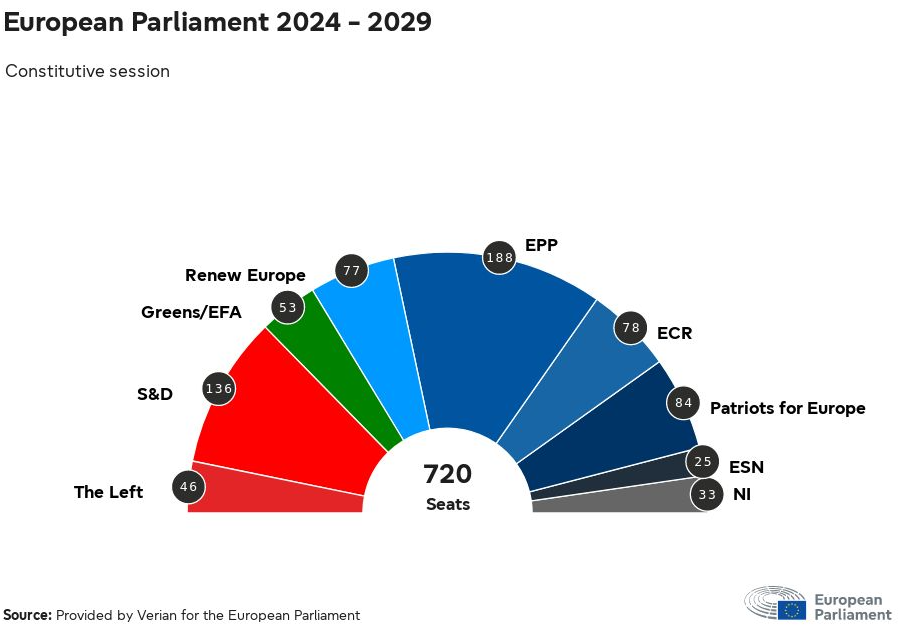
Parties of the European Parliament 2024-2029: Constitutive session
Lena Schilling (Greens/EFA) from Austria (23 years old) is the youngest MEP, while Leoluca Orlando (Greens/EFA) from Italy (77 years old) is the oldest. The average age of MEPs is 50.
At the beginning of the tenth term, there are eight political groups, one more than in the previous legislature. 32 MEPs remain non-attached.
Roberta Metsola (EPP, MT) was re-elected as President of the European Parliament until 2027. She won the election in the first round of voting, where she received an absolute majority of 562 votes cast out of 699 by secret paper ballot, among two candidates.
On the 16 July, the European Parliament introduced changes that aim to enable it to respond to citizens’ expectations more effectively by making best use of every tool available.
All of Parliament’s 20 standing committees and four subcommittees held their constitutive meetings on Tuesday 23 July to elect their Chair and Vice-Chairs. German S&D MEP Bernd Lange was re-elected Chair of Committee on International Trade for another two and a half years and German EPP MEP David McAllister was again elected Chair of the Committee on Foreign Affairs
The European Commission
The European Parliament re-elected Ursula von der Leyen to serve as President of the European Commission for a second five-year term. 401 MEPs voted in favour, 284 against and 15 abstained. Politico reports she had the backing of the three mainstream, pro-EU groups — the European People’s Party, the Socialists and the liberals of Renew.
Commission President von der Leyen had given each member state a deadline of the end of August to submit their candidate for the next European Commission. She had requested that each country submit two candidates – one male and one female – in order to achieve her goal of a gender balanced Commission, however not all member states did this. Politico carries the full list of candidates.
This new Commission will include two new portfolios – a Commissioner for Defence and a Commission for the Mediterranean. The President will assign portfolios before each candidate appears before the European Parliament for approval hearings (likely end of September/early October). Following the European Parliament hearings for the last Commission, MEPs did not approve three countries’ candidates.
EU Commission and the UK
On 25 July, the European Commission decided to send a reasoned opinion (INFR(2020)2202) to the United Kingdom regarding its failure to comply with EU law on free movement of EU citizens and their family members.
It first launched infringement proceedings against the UK over the matter in May 2020, noting: "The rights of EU citizens resident in the UK after the end of the transition period, as set out in the Withdrawal Agreement, are built on the rights that they currently enjoy in the United Kingdom under EU rules. The United Kingdom's shortcomings in the implementation and transposition of EU free movement law risks therefore also affecting the implementation of the citizens' rights under the Withdrawal Agreement after the end of the transition period."
The UK has two months to respond to the its concerns, with the European Commission warning that it may decide to refer the case to the European Court of Justice.
Windsor Framework Democratic Scrutiny Committee
The Windsor Framework Democratic Scrutiny Committee (DSC) continued to meet over the summer months. It considered the following EU Regulations:
- Regulation (EU) 2024/1781 establishing a framework for the setting of eco-design requirements for sustainable products
- Regulation (EU) 2024/1860 as regards a gradual roll-out of Eudamed, the obligation to inform in case of interruption or discontinuation of supply, and transitional provisions for certain in vitro diagnostic medical devices
- Regulation (EU) 2024/1849 on mercury as regards dental amalgam and other mercury-added products subject to export, import and manufacturing restrictions
- Regulation (EU) 2024/1689 laying down harmonised rules on artificial intelligence
- Regulation (EU) 2024/1938 on standards of quality and safety for substances of human origin intended for human application
The Committee decided to conduct inquiries into EU Regulation 2024/1849 on mercury; and EU Regulation 2024/1938 on standards of quality and safety for substances of human origin. Reports published by the Committee can be read here.
EU Regulation 2024/1849 bans the use of dental amalgam in the EU from 1 January 2025 (with some exceptions). Concerns had been highlighted to the DSC by the British Dental Association and Department of Health, as part of its evidence gathering into the proposed Regulation.
On 19 July 2024 (during the course of the DSC’s inquiry), the European Commission published Notice C/2024/4675, which states that as long as the Northern Ireland complies with certain conditions, “the Commission takes the view that dental amalgam may be used in Northern Ireland for the purpose of dental treatment for patients residing in the United Kingdom, and continue importing dental amalgam from outside the Union for that purpose until 31 December 2034 or until the date agreed under the framework of the Minamata Convention on Mercury, whichever is earlier”. The Committee noted that, “had such provision been included in Regulation (EU) 2024/1849, it is unlikely that the legal text would have significantly differed from the Mercury Regulation as enacted, which had contemplated a phase-out of dental amalgam by 2030”. The Committee concluded that the Regulation “would not have a significant impact specific to everyday life of communities in Northern Ireland in a way that is liable to persist”.
The Committee also published a report on EU Regulation 2024/1938 on standards of quality and safety for substances of human origin (SoHO). The Committee concluded that it was unable to reach a view on whether the replacement EU act would have a significant impact specific to everyday life of communities in Northern Ireland in a way that is liable to persist. The Committee heard from Departmental of Health officials that “the crux of the detail and any impact in Northern Ireland will not be known until the technical detail has been progressed by the European Commission through the SoHO coordination board and guidance has been shared”. Officials also highlighted the Common Frameworks in this area, and noted indications from the UK Government in relation to divergence. In its Explanatory Memorandum, the Government states, “The Government is also committed to ensuring the smooth flow of substances of human origin between Great Britain and Northern Ireland and, if needed, will take action to support GB-NI movement.”
European Ireland Movement Polling
In 2024, Amárach Research was commissioned by European Movement Ireland to undertake research on attitudes to the EU across the island of Ireland. This research programme was built around a nationally representative sample of 1200 people in both Northern Ireland and the Republic of Ireland. The survey data collection was undertaken online, and the two surveys ran simultaneously in both locations.
The 2024 results indicate a significant decline in agreement that the EU is moving in the right direction. This decline is evident in both jurisdictions with 49% think that the EU is moving in the right direction in the Republic of Ireland (vs 58% in 2023).
In Northern Ireland, 49% think that the EU is moving in the right direction (vs 58% in 2023) and 33% think that the EU is not moving in the right direction (vs 28% in 2023).
Nearly half of respondents in both jurisdictions believe that the EU’s performance is strongest in the area of trade. A similar proportion in both jurisdictions believe that the EU’s performance is weakest in the area of migration.
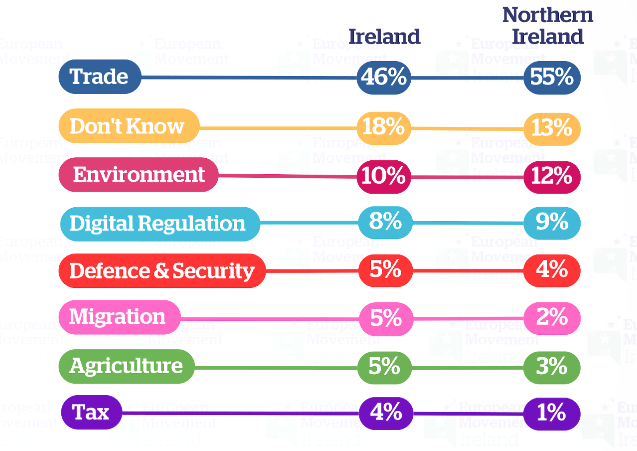
Where do you think the EU’s performance is the strongest?
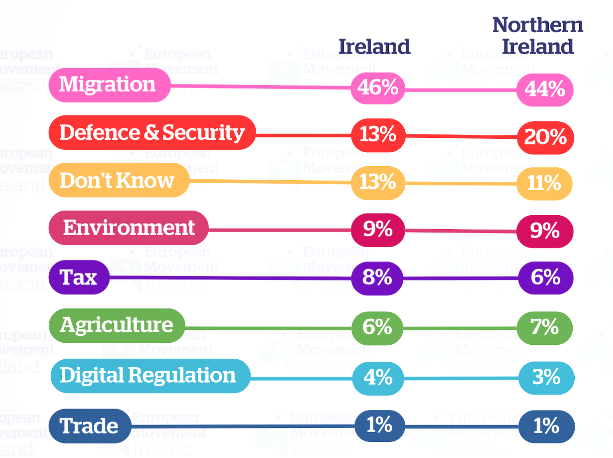 Where do you think the EU’s performance is the weakest?
Where do you think the EU’s performance is the weakest?
It showed that in Northern Ireland 28% trust the EU the most, 24% trust the Irish Government the most, 8% trust the UK Government and 8% trust the Northern Ireland Executive. However, nearly one-third (31%) trust none of these institutions. In the Republic of Ireland, while 34% trust the Irish Government the most, 26% trust the EU the most and 40% trust neither of these institutions.
Other news
- The Independent reports that Ireland is set to play a pivotal role in Keir Starmer’s plan for a crucial reset in relations with the European Union.
- Following the change of Government, the Centre for European Reform asks if the UK should pursue dynamic alignment with the EU.
- At a glance: infographic of showing an overview of the political groups formed in the European Parliament after elections in June 2024.
- Jennifer Rankin of the Guardian reports that the EU and UK are expected to hold their first summit next spring.
- Politico reports that Germany wants to turn the British prime minister’s proposed security agreement into a broader EU-UK “reset”: encompassing everything from agricultural rules to the Erasmus student exchange program.
- The British Ports Association has written to the Cabinet Office and the Department for Environment, Food and Rural Affairs to ask for compensation for UK ports if the government strikes a deal to lower trade barriers with the EU, after they spent millions of pounds on building post-Brexit border control facilities.
- The UK government rejected a free movement deal for young people with Spain.
- The Financial Times (1 Aug) reports that the European Commission has issued a list of eight demands that the UK must fulfil to “demonstrate real UK government commitment” to honouring its Brexit agreement with Brussels.
- Derry City Football Club has reported difficulties in signing non-British and non-Irish players because of the post-Brexit transfer process.



